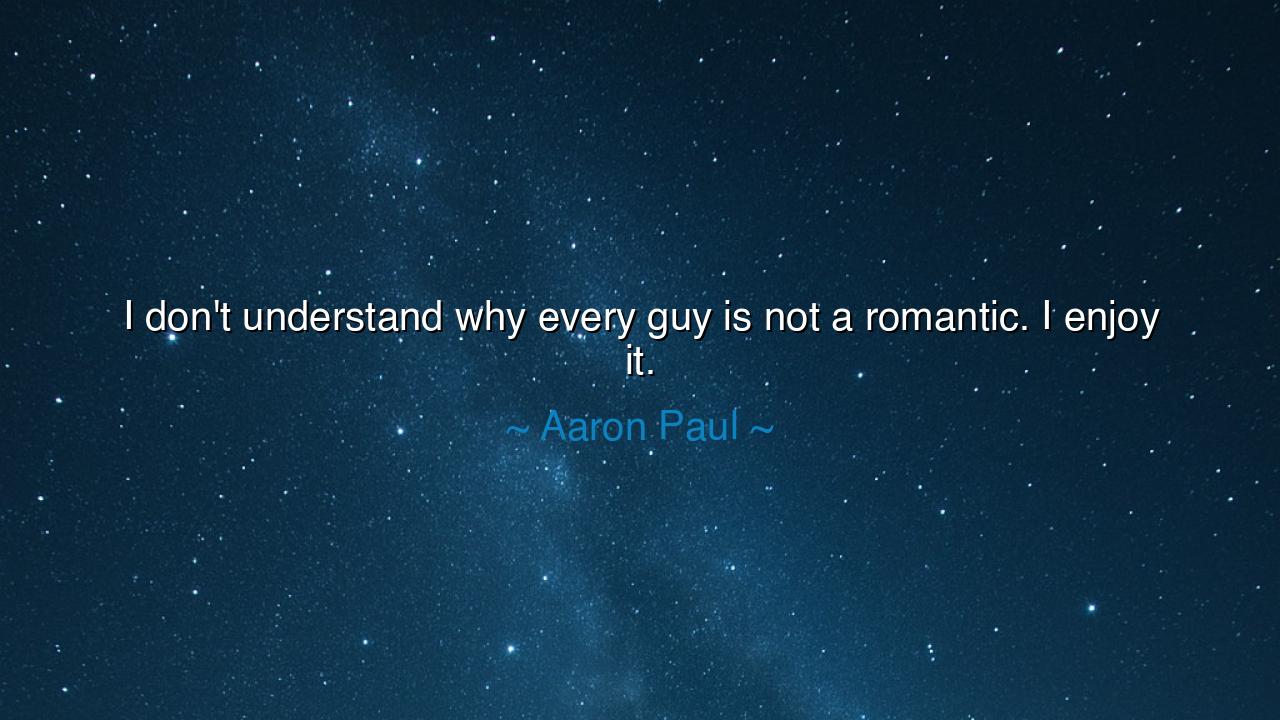
I don't understand why every guy is not a romantic. I enjoy it.






"I don't understand why every guy is not a romantic. I enjoy it." – Aaron Paul. In these words, Paul reveals a deep appreciation for romanticism, an appreciation that transcends simple affection and touches the very essence of what it means to be human. To be a romantic, as Paul implies, is not merely to indulge in fleeting desires or superficial gestures, but to actively embrace the emotion and depth of human connection. He marvels at the fact that not all men are inclined toward this form of expression, as if to say that there is something inherently beautiful and necessary about expressing love and devotion. Romance, for Paul, is not just a sentiment but an essential part of what makes life rich, meaningful, and worth living.
In the ancient world, romanticism was revered as a virtue, particularly in the context of love and devotion. The Greek concept of Eros was not only about passion but about the pursuit of beauty, truth, and spiritual connection. Plato, in his dialogue Symposium, speaks of love as a force that elevates the soul, leading it toward divine wisdom and understanding. Eros, the god of love, was seen as the guiding force that drove individuals toward their highest potential, creating bonds that were deeply meaningful and transformative. In this sense, to be a romantic was not to indulge in fleeting infatuation but to engage with a force that brought both personal and spiritual growth.
Similarly, the ancient Romans revered the concept of amour—not as a simple passion, but as something that required deep commitment and sacrifice. The poet Ovid, in his Ars Amatoria, presents love as a game that involves both strategy and sincerity. His teachings suggest that true love requires effort, understanding, and a willingness to go beyond oneself for the sake of another. This is the essence of romanticism: it is about actively cultivating love and connection, rather than waiting passively for it to happen. It is no wonder, then, that Aaron Paul expresses such confusion at the absence of romanticism in men—he sees it as a natural, fulfilling part of life that leads to greater emotional depth and connection.
In the history of great lovers, we see the same theme of romantic devotion. Antony and Cleopatra, for example, are often celebrated as one of the most romantic couples in history. Their love, though tumultuous and ultimately tragic, was characterized by their willingness to sacrifice and endure for each other. Despite the immense pressures of war and politics, their bond remained a symbol of passion, loyalty, and devotion. Antony’s romanticism, his willingness to risk everything for Cleopatra, represents the ideal of love as an active force that propels individuals to the highest peaks of courage and human connection.
The romanticism that Paul celebrates is also evident in the lives of countless poets and artists throughout history. Consider William Shakespeare, whose works are imbued with romantic devotion. From the timeless love of Romeo and Juliet to the deeper, more complex relationships in The Tempest and A Midsummer Night’s Dream, Shakespeare understood the power of love to transform the soul, to lead characters to their highest states of joy and despair. Shakespeare did not just write about love in its idealized form; he explored its complexities, showing how it could both uplift and wound. His works illustrate the centrality of romanticism in the human experience—how love is at the heart of what makes us both vulnerable and strong.
The lesson we learn from Aaron Paul's words is that romance is not just for the chosen few, nor should it be seen as a frivolous or optional part of life. It is a fundamental part of the human condition. Romantic love—with all its passion, vulnerability, and beauty—offers us the opportunity to transcend the mundane and to experience a deeper, more authentic connection with others. It is through romance that we can express our truest selves, not just to our lovers, but also to the world. In a way, to be a romantic is to acknowledge the fragility of life and to invest in the deep connections that make our existence meaningful.
In our own lives, we should embrace romanticism not as an act of superficiality, but as a conscious choice to engage deeply with the people and the world around us. Whether in relationships, friendships, or even in our creativity, we should let love guide our actions, our words, and our decisions. Romance is not about grand gestures alone, but about the quiet, everyday acts of care, understanding, and compassion that help us build lasting, meaningful connections. Like Paul, we should embrace romance for the joy it brings, not just to the ones we love, but to our own hearts as well, knowing that it is through these connections that we find our highest purpose.
Thus, let us carry forward the wisdom of romanticism, recognizing that it is not just about infatuation, but about actively choosing to connect, to care, and to grow with those around us. Romanticism is the force that leads us beyond ourselves, toward a world where love becomes the guiding principle of our lives, shaping not only our relationships but the world itself. Like the great figures of history, from Achilles to Romeo, let us find the courage to embrace love’s transformative power, knowing that it is through this act of romantic devotion that we find both meaning and joy.






AAdministratorAdministrator
Welcome, honored guests. Please leave a comment, we will respond soon